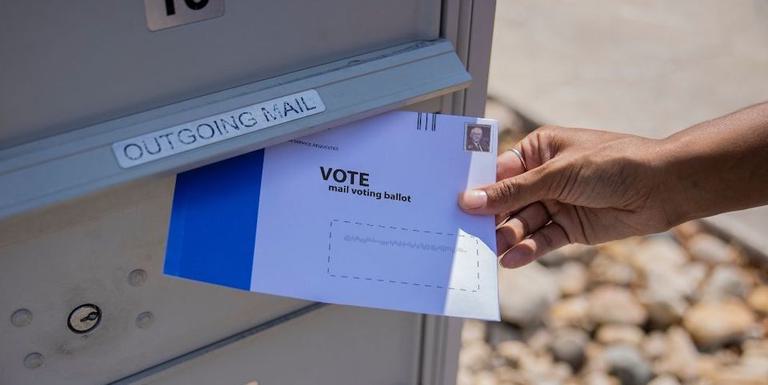
Culture & the Family
Ray Carter | September 2, 2021
Court finds postage is not a poll tax on absentee voters
Ray Carter
Judges in the U.S. Court of Appeals for the 11th Circuit have ruled that paying postage to mail in an absentee ballot is not an unconstitutional poll tax.
The ruling upholds a lower-court decision and aligns with the outcome of a similar case that challenged Oklahoma election law.
The new ruling regards a challenge filed by the Black Voters Matter Fund and two private citizens in Georgia who claimed that paying postage to mail in an absentee ballot violated the Equal Protection Clause of the U.S. Constitution’s Fourteenth Amendment and violated the Twenty-Fourth Amendment’s prohibition on imposition of a poll tax.
In their ruling, the judges rejected those arguments and upheld the legality of Georgia’s absentee-voting processes.
“The novel theory that Plaintiffs ask us to adopt—that Georgia imposes a ‘tax’ by not paying for a service (postage) to assist voters who choose to vote through the absentee process and then choose to return their ballot by mail—simply does not hold water,” the opinion stated.
The decision continued, “Georgia voters, without paying any money, have the option to vote in person, bring their absentee ballot to the county election office, or drop their ballot in a county drop box.”
For citizens who mail in an absentee ballot, the judges noted voters were “buying a service (the delivery of their mail)” from the U.S. Postal Service and that the state of Georgia “does not receive any money from those sales.”
The judges declared the plaintiffs’ claims “border on the frivolous.”
The opinion also noted that the Postal Service’s policy is to “deliver official election mail—including absentee ballots—even if it contains insufficient or no postage.”
“The premise underlying Plaintiffs’ argument—that any payment a citizen makes to the government must be either a penalty or a tax—is demonstrably false because some payments that citizens make to the government are certainly neither penalties nor taxes,” the opinion stated. “For instance, a citizen who receives electricity from the Tennessee Valley Authority is not being penalized or taxed when she pays her monthly electricity bill.”
The judges also rejected arguments that Georgia was violating the Equal Protection Clause by discriminating against absentee-by-mail voters who fail to pay postage fees, writing that “Georgia is not denying the right to vote to any voters” by providing “the option to mail in absentee ballots.”
“While voting often involves incidental costs like transportation, parking, child care, taking time off work, and—for those who choose to vote absentee by mail—the cost of a postage stamp, those incidental costs do not mean that Georgia has imposed an unconstitutional poll tax or fee on its voters,” the opinion stated.
In a footnote, the judges declared the plaintiffs’ claims “border on the frivolous. At this time, however, we are not imposing sanctions.”
Oklahoma Democrats have similarly argued that paying the cost of postage to mail in an absentee ballot represents a form of poll tax, raising the issue during the 2020 legislative session when lawmakers approved a law requiring that absentee voters include a photocopy of their ID along with their ballot as an election-security measure.
“The discussion around whether you can afford a stamp or what, or a copy, or anything, shouldn’t matter, because a single penny standing between a person and their constitutional right to vote is a poll tax,” said state Rep. Forrest Bennett, D-Oklahoma City.
The Oklahoma Democratic Party filed a lawsuit that sought to have several provisions of Oklahoma election law struck down, including a ban on ballot harvesting and ID-requirements for absentee voters. That challenge also claimed payment for postage represented a poll tax.
Those arguments were rejected by U.S. District Court Judge John Dowdell in September 2020.
In his opinion, Dowdell noted that Oklahoma’s absentee voters “may avoid postage altogether and return their absentee ballots at the county election board before 5:00 p.m. the day before the election” or “receive postage gifted from third parties,” and concluded that any burden absentee voters faced as a result of paying postage “is light” and not a violation of constitutional rights.

Ray Carter
Director, Center for Independent Journalism
Ray Carter is the director of OCPA’s Center for Independent Journalism. He has two decades of experience in journalism and communications. He previously served as senior Capitol reporter for The Journal Record, media director for the Oklahoma House of Representatives, and chief editorial writer at The Oklahoman. As a reporter for The Journal Record, Carter received 12 Carl Rogan Awards in four years—including awards for investigative reporting, general news reporting, feature writing, spot news reporting, business reporting, and sports reporting. While at The Oklahoman, he was the recipient of several awards, including first place in the editorial writing category of the Associated Press/Oklahoma News Executives Carl Rogan Memorial News Excellence Competition for an editorial on the history of racism in the Oklahoma legislature.